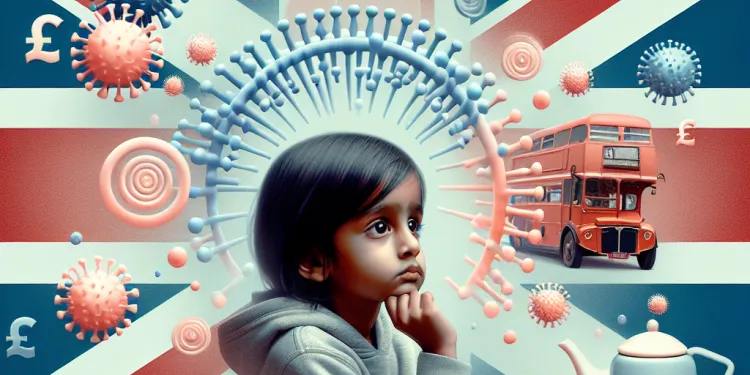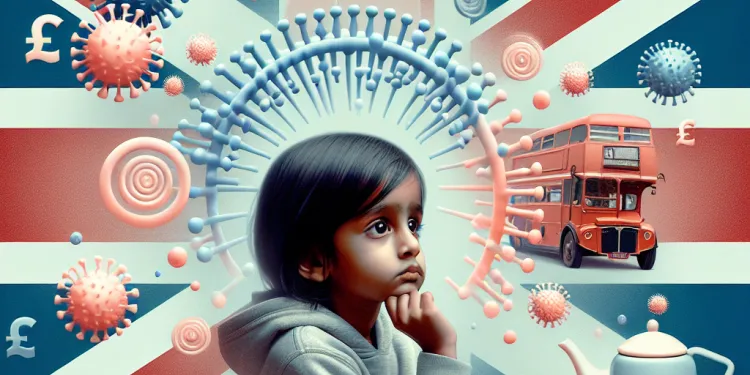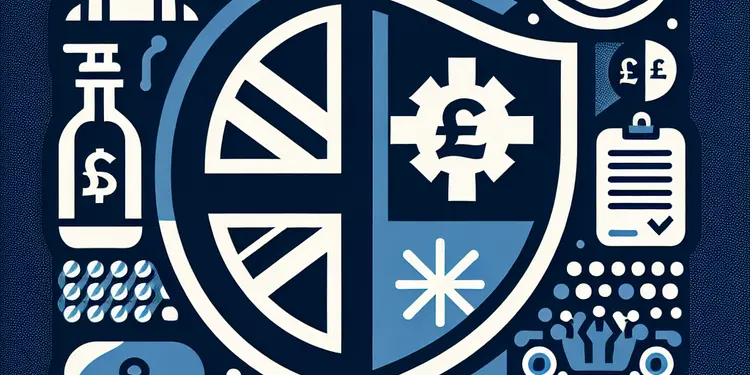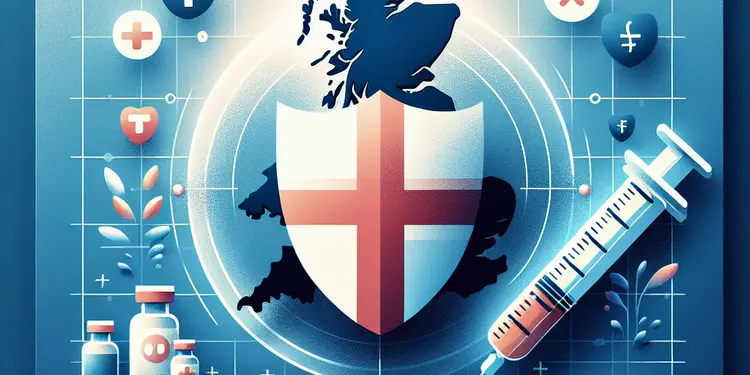
Find Help
More Items From Ergsy search
-

Are children more affected by new variants of COVID?
Relevance: 100%
-
New Covid Variant Strains
Relevance: 88%
-
Do new variants affect COVID-19 testing?
Relevance: 79%
-

Are new COVID-19 variants more dangerous?
Relevance: 77%
-
How often do new COVID-19 variants emerge?
Relevance: 76%
-

Do vaccines work against new COVID-19 variants?
Relevance: 75%
-

How do scientists name new Covid-19 variants?
Relevance: 75%
-
What is the process to identify a new Covid-19 variant?
Relevance: 75%
-

How can I protect myself from new COVID-19 variants?
Relevance: 73%
-
What is a COVID-19 variant?
Relevance: 71%
-
What is the Covid-19 Stratus variant?
Relevance: 70%
-

Are new variants more transmissible?
Relevance: 69%
-

What are the Nimbus and Stratus variants of Covid?
Relevance: 68%
-

Can new variants cause reinfection?
Relevance: 67%
-
How are COVID-19 variants detected?
Relevance: 66%
-
How do COVID-19 variants arise?
Relevance: 66%
-
Where can I learn about real Covid-19 variants?
Relevance: 62%
-

Should I be worried about new variants?
Relevance: 62%
-

Is there concern about new hypothetical variants like Nimbus and Stratus?
Relevance: 61%
-

How can I protect myself from Covid-19 variants?
Relevance: 60%
-

Is the COVID jab effective against new variants?
Relevance: 59%
-

Do all mutations in the virus lead to new variants?
Relevance: 57%
-

Do vaccines protect against the Stratus variant?
Relevance: 49%
-

Is the Nimbus variant more contagious?
Relevance: 48%
-

What would happen if the Nimbus variant existed?
Relevance: 48%
-

Are COVID jabs safe?
Relevance: 46%
-

Has research been conducted on the Nimbus variant?
Relevance: 45%
-

Should I get vaccinated if I already had COVID-19?
Relevance: 43%
-

Are there protocols for handling hypothetical variants?
Relevance: 42%
-

Why do some variants spread more easily?
Relevance: 41%
-

How long does immunity last after getting the COVID jab?
Relevance: 41%
-

Do I still need to wear a mask after getting the COVID jab?
Relevance: 41%
-
Should I get a COVID jab?
Relevance: 41%
-
How do COVID jabs work?
Relevance: 40%
-

What impact could a variant like Stratus have if real?
Relevance: 40%
-

Can hypothesized variants be used in scientific modeling?
Relevance: 40%
-

What sources should I consult for information on Covid-19?
Relevance: 39%
-
Are the symptoms different with new COVID-19 variants?
Relevance: 39%
-
Does the flu vaccine protect against COVID-19?
Relevance: 37%
-
What are the benefits of getting a COVID jab?
Relevance: 36%
Introduction
The appearance of new variants of the COVID-19 virus has raised numerous questions regarding their impact, particularly on vulnerable groups such as children. With the emergence of different strains, including the Delta and Omicron variants, it is crucial to understand how these variants may affect children differently compared to previous strains.
Characteristics of New Variants
New variants of the COVID-19 virus often possess mutations that can affect their transmissibility and virulence. These mutations may allow the virus to spread more easily or potentially evade immune responses to a certain degree. The United Kingdom has seen the dominance of different variants at different times, each with distinct features that could affect infection patterns in children.
Impact on Children's Health
The impact of COVID variants on children has been closely monitored by health authorities. Generally, children have been found to have milder symptoms compared to adults, and this trend has largely continued even with new variants. However, there have been concerns about increased transmissibility leading to higher infection rates among children, particularly during the school term when close contact is unavoidable.
Transmissibility in Schools
Schools have been a focal point for studies on virus transmission among children. With new, more transmissible variants, there is a potential for higher outbreak rates in schools. This has led to various preventive measures being implemented, such as enhanced ventilation, regular testing, and vaccination programs for eligible students. These measures aim to reduce the spread and protect both children and staff.
Vaccination and Immunity
As of now, vaccination programs for children have been rolled out with approvals for younger age groups being considered. Vaccines have proven to reduce the severity of COVID-19 infections and the risk of transmission. With new variants, maintaining immunity through vaccination becomes even more critical to protect children and curb the spread of the virus.
Future Considerations
Continued monitoring and research are necessary to understand the full implications of new COVID-19 variants on children. Public health policies in the UK are informed by ongoing studies and emerging evidence. Parents and guardians are encouraged to stay updated with the latest guidance from health authorities and to ensure that their children adhere to health and safety practices.
Conclusion
While children generally experience milder symptoms, the increased transmissibility of new COVID-19 variants poses challenges. By implementing preventative measures and advancing vaccination coverage, the UK aims to protect children and control the spread of COVID-19. Ongoing surveillance and research remain key to adapting strategies to safeguard public health effectively.
Introduction
There are new types of the COVID-19 virus. These new types are called variants, like Delta and Omicron. People want to know how these variants affect children. It is important to understand if they make children more sick than the older versions of the virus.
Characteristics of New Variants
New COVID-19 variants have changes in them called mutations. These changes can make the virus spread easier or act differently. In the UK, different variants have been seen at different times. Each variant can affect how many children get infected.
Impact on Children's Health
Experts are watching how COVID affects children. Usually, children get less sick than adults. Most of the time, this is still true with new variants. But some people worry that more children could catch the virus because it spreads faster, especially when they are in school.
Transmissibility in Schools
Schools are important places to study how the virus spreads among children. New variants can spread more easily, which means more children might get sick. Schools use things like better air flow, regular testing, and vaccines to help keep children and teachers safe.
Vaccination and Immunity
There are now vaccines for children, and soon younger kids might get them too. Vaccines help to make COVID-19 less serious and stop it from spreading. With new variants, getting vaccinated is very important to keep children safe.
Future Considerations
We need to keep learning about how new variants affect children. The UK uses new information to make good health rules. Parents should listen to health advice and help kids follow safe practices.
Conclusion
Even though kids often do not get very sick, new COVID variants that spread more easily are a worry. The UK is working to protect kids with safety measures and vaccines. Understanding and watching the situation helps keep everyone healthy.
Frequently Asked Questions
Are children more susceptible to new variants of COVID-19?
Research is ongoing, but some new variants may affect children more than previous strains. Public health guidelines emphasize monitoring and vaccination to protect children.
What symptoms do children exhibit if infected with new COVID-19 variants?
Children may exhibit symptoms similar to those seen in adults, such as fever, cough, sore throat, and fatigue, though these can vary with different variants.
Have hospitalization rates increased for children with new variants of COVID-19?
In some areas, hospitalization rates for children have increased with certain COVID-19 variants, but the overall risk remains lower than in adults.
Are vaccines effective for children against new variants of COVID-19?
Current vaccines have shown effectiveness in reducing severity and transmission of COVID-19, including new variants, in eligible children.
How can I protect my children from COVID-19 variants?
Ensure they follow public health guidelines, such as wearing masks and practicing good hygiene, and get vaccinated if eligible.
Do new COVID-19 variants cause more severe disease in children?
Some new variants have been linked to an increase in severe cases among children, although most children still experience mild symptoms.
Are school closures necessary to protect children from new COVID-19 variants?
Decisions on school closures depend on the local spread of the virus and public health guidance, balancing educational needs and safety.
What age group among children is most affected by new COVID-19 variants?
While COVID-19 can affect all age groups, data on specific age groups and new variants is still being studied.
Have there been cases of long COVID in children with new variants?
Yes, children can experience long COVID symptoms after infection with new variants, although it appears less common than in adults.
Is testing for COVID-19 variants different for children?
The testing process for children is similar to that for adults, involving PCR or rapid antigen tests to detect the virus.
Can children transmit new variants of COVID-19 to adults?
Yes, children can transmit COVID-19, including new variants, to adults, which is why prevention measures continue to be important.
What role do new variants play in multisystem inflammatory syndrome in children (MIS-C)?
MIS-C has been observed following COVID-19 infections, but research is ongoing to understand its relationship with specific variants.
Are there any new guidelines for children returning to school with COVID-19 variants?
Guidelines may be updated based on variant spread, focusing on vaccination, mask-wearing, and other preventive measures.
How do symptoms of new COVID-19 variants in children differ from previous strains?
Symptoms largely remain similar, though some variants may lead to different patterns of symptoms, still under investigation.
Is there a higher risk of reinfection in children with new COVID-19 variants?
Some new variants may increase the risk of reinfection due to changes in the virus, but findings vary.
Should parents be concerned about new COVID-19 variants affecting children more severely?
While vigilance is necessary, most children still experience mild illness. Parents should follow health guidelines for protection.
Has vaccine availability for children impacted their risk from new COVID-19 variants?
Vaccination has helped mitigate risk, decreasing severe outcomes even with emerging variants among eligible age groups.
Do new variants of COVID-19 spread more easily among children?
Some variants have shown increased transmissibility, potentially leading to higher case numbers in children and others.
What ongoing research is being done on COVID-19 variants affecting children?
Research is focused on variant impact, vaccine efficacy, and long-term effects in children to inform public health strategies.
How should parents talk to children about new COVID-19 variants?
Parents should provide age-appropriate, reassuring information, emphasizing safety measures and the importance of vaccination.
Do new types of COVID-19 affect children more than others?
Help to understand:
- Use pictures or videos to explain COVID-19.
- Talk with a grown-up if you have questions.
- Read together with someone who can help explain.
Scientists are still studying, but some new types of the virus might make kids sicker than before. Health experts say it's important to keep an eye on kids and make sure they get their shots to stay safe.
What signs show if children get sick with new COVID-19 types?
Here is a simple list:
- Fever (feel hot)
- Cough (cough a lot)
- Tiredness (feel very tired)
- Headache (head hurts)
- Sore throat (throat hurts)
- Runny nose (nose drips)
If you think a child is sick, it is good to:
- Talk to a doctor
- Get tested for COVID-19
- Rest and drink water
Ask for help if you need it!
Kids can have the same signs as grown-ups when they are sick. They might have a fever, which is when their body feels hot. They might cough, which is when they make a noise from their chest. They might have a sore throat, which is when their throat hurts. They might feel very tired and cannot do much. These signs can be different with different kinds of sickness.
Are more children going to the hospital because of new types of COVID-19?
If you find it hard to read, you can try these things:
- Read slowly and take your time.
- Ask someone to read with you.
- Use a computer or tablet to hear the words out loud.
- Look for videos or pictures about the topic to help you understand better.
In some places, more kids are going to the hospital because of some types of COVID-19. But kids are still less likely to get very sick than adults.
Do COVID-19 vaccines work for children against new types of the virus?
COVID-19 is a virus that can make people sick.
A vaccine is a shot that helps stop people from getting sick.
Scientists make vaccines to protect us from the virus.
Sometimes, the virus changes. These changes are called new variants.
We want to know if the vaccines can still help kids when the virus changes.
Reading tools like audio books or reading apps can help understand this topic better.
The COVID-19 shots help stop kids from getting very sick. They also help stop the spread of the virus, even new types of the virus.
How can I keep my children safe from COVID-19 variants?
Here are some ways to help keep your children safe from the virus:
- Make sure they wash their hands often with soap and water.
- Try to keep them at least 2 meters apart from people who don't live with them.
- Let them wear a mask when they have to be near people.
- Help them learn to cover their mouth and nose when they sneeze or cough.
- Keep their room clean and airy by opening windows when you can.
- Take them to get their COVID-19 vaccine if they are old enough.
If you need more help, ask a doctor or look at trusted websites for advice.
Make sure they follow rules to stay healthy. This includes wearing masks, keeping clean, and getting vaccinated if they can.
Do new types of COVID-19 make kids sicker?
Some new kinds of the virus can make more kids very sick. But most kids still only get a little bit sick.
Do we need to close schools to keep kids safe from new types of COVID-19?
Words to help you understand:
- Variants: New kinds of the virus.
- COVID-19: A sickness that can make people feel unwell.
When reading, use these tips:
- Read slowly and carefully one sentence at a time.
- Ask someone to help if you don't understand something.
- Look up pictures or videos about COVID-19 to learn more.
Schools might close when a lot of people are getting sick from the virus. Health experts help decide when to close schools. They think about keeping kids safe and also how important it is to learn.
Which age group of kids is most affected by new COVID-19 types?
COVID-19 can make people of all ages sick. Scientists are looking at how it affects different ages and new types of the virus. We are still learning more about it.
Do kids get long COVID with new virus types?
Long COVID means feeling sick for a long time after getting the virus.
Ask a doctor for more help. They can explain it.
You can also use pictures or videos to understand better.
Yes, kids can have long COVID symptoms after getting sick with new types of the virus. But it doesn't happen as often as it does in grown-ups.
Do kids get tested for COVID-19 variants in a different way?
Testing kids for the virus is like testing grown-ups. Doctors can use PCR tests or quick tests to see if the virus is there.
Can kids pass new types of COVID-19 to grown-ups?
Kids can catch COVID-19. They can also give it to other people, like adults. This includes new kinds of the virus.
If you want to stay safe, you can:
- Wash your hands often.
- Wear a mask in busy places.
- Keep a safe distance from others.
If you find reading hard, you can:
- Ask someone to explain it to you.
- Use pictures to help you understand.
- Listen to audio if it's available.
Yes, children can spread COVID-19 to grown-ups. This includes new kinds of the virus. This is why it's important to keep doing things that stop the virus from spreading.
How do new virus types affect MIS-C in children?
Doctors have noticed that some kids get sick after having COVID-19. This sickness is called MIS-C. Scientists are still trying to learn more about how it is linked to different types of the virus.
Are there new rules for kids going back to school with COVID-19?
Here are some tips to help:
- Check the school's website for updates.
- Ask teachers or school staff if unsure.
- Use pictures or signs to understand the rules better.
The rules might change if new sickness spreads. People should get their vaccines, wear masks, and follow other ways to stay healthy.
How are the signs of new COVID-19 types in kids different from the old ones?
Kinds of COVID-19 can change. These changes are called variants.
New variants might make kids feel different from the old ones.
Kids can feel sick in new ways.
If you are worried about COVID-19, talk to a doctor.
To understand better, try these tips:
- Use pictures or videos to explain.
- Break information down into small pieces.
- Ask questions and talk with others.
Most of the time, the signs of being sick are the same. But sometimes, different types of the illness can make different signs. Scientists are still trying to understand how this works.
Can children catch COVID-19 again with new virus types?
Children might get COVID-19 again if the virus changes. These changes are called "variants".
Here are some tips to help understand:
- Read slowly and take your time.
- Ask an adult for help if you're confused.
- Use a dictionary to look up hard words.
There are new kinds of the virus. Some of these new kinds can more easily make you sick again. But scientists are still learning, and their answers are not all the same.
Should parents worry about new types of COVID-19 making children sicker?
Parents might wonder if new kinds of COVID-19 could make kids more sick. Here are some simple ways to understand:
- New types of COVID-19 are always being watched by doctors.
- Right now, not all types make kids sicker than before.
- If worried, parents can talk to a doctor for advice.
- Washing hands and wearing masks can help keep kids safe.
Parents can help kids understand by using pictures or stories. Simple explanations work best.
It is important to be careful, but most kids only get a little bit sick. Parents should follow health rules to keep everyone safe.
Do COVID-19 vaccines help keep children safe from new kinds of the virus?
The vaccine helps keep people safe. It makes sure that people don't get really sick, even if the virus changes a bit. It works well for people who can get the vaccine.
Do New Types of COVID-19 Spread More Easily Among Kids?
Some kinds of COVID-19 can spread faster. We want to know if these new types spread more easily to kids.
People are studying this. They want to make sure kids stay safe.
If you want to understand better, you can:
- Ask an adult to explain it to you.
- Use pictures and videos to learn more.
- Use a reading app to help you understand the words.
Some types of the virus can spread more easily. This means more kids and other people might get sick.
What are scientists learning about COVID-19 changes in children?
Scientists are studying how COVID-19 changes, called "variants," affect kids. They want to understand if new changes make kids more sick or spread more easily.
Helpful tools and tips:
- Use pictures to explain how viruses change and spread.
- Watch short videos made for kids about COVID-19.
- Talk to a doctor or nurse if you have questions.
Scientists are studying how changes in the virus affect people. They are looking at how well vaccines work and what happens to kids who get sick for a long time. This helps plan how to keep people safe and healthy.
How can parents talk to kids about new COVID-19 types?
Talking about COVID-19 can be hard. Here are some tips to help:
- Use simple words to explain what a COVID-19 variant is. You can say it is a "new type" of the virus.
- Be honest but keep it simple. Tell them what they need to know without making them scared.
- Let them ask questions. Answer as best as you can, and it is okay to say "I don't know."
- Reassure them. Let them know that adults are working hard to keep everyone safe.
If your child has trouble understanding:
- Use pictures or videos. They can help explain things.
- Read stories together about staying healthy.
- Practice washing hands and wearing masks together. Make it fun!
Tell them it is okay to feel worried, and let them talk about their feelings.
Parents should give simple and comforting information. Talk about how to stay safe and how important vaccines are to keep everyone healthy.
Useful Links
This website offers general information and is not a substitute for professional advice.
Always seek guidance from qualified professionals.
If you have any medical concerns or need urgent help, contact a healthcare professional or emergency services immediately.
Some of this content was generated with AI assistance. We’ve done our best to keep it accurate, helpful, and human-friendly.
- Ergsy carfully checks the information in the videos we provide here.
- Videos shown by Youtube after a video has completed, have NOT been reviewed by ERGSY.
- To view, click the arrow in centre of video.
- Most of the videos you find here will have subtitles and/or closed captions available.
- You may need to turn these on, and choose your preferred language.
- Go to the video you'd like to watch.
- If closed captions (CC) are available, settings will be visible on the bottom right of the video player.
- To turn on Captions, click settings .
- To turn off Captions, click settings again.
More Items From Ergsy search
-

Are children more affected by new variants of COVID?
Relevance: 100%
-
New Covid Variant Strains
Relevance: 88%
-
Do new variants affect COVID-19 testing?
Relevance: 79%
-

Are new COVID-19 variants more dangerous?
Relevance: 77%
-
How often do new COVID-19 variants emerge?
Relevance: 76%
-

Do vaccines work against new COVID-19 variants?
Relevance: 75%
-

How do scientists name new Covid-19 variants?
Relevance: 75%
-
What is the process to identify a new Covid-19 variant?
Relevance: 75%
-

How can I protect myself from new COVID-19 variants?
Relevance: 73%
-
What is a COVID-19 variant?
Relevance: 71%
-
What is the Covid-19 Stratus variant?
Relevance: 70%
-

Are new variants more transmissible?
Relevance: 69%
-

What are the Nimbus and Stratus variants of Covid?
Relevance: 68%
-

Can new variants cause reinfection?
Relevance: 67%
-
How are COVID-19 variants detected?
Relevance: 66%
-
How do COVID-19 variants arise?
Relevance: 66%
-
Where can I learn about real Covid-19 variants?
Relevance: 62%
-

Should I be worried about new variants?
Relevance: 62%
-

Is there concern about new hypothetical variants like Nimbus and Stratus?
Relevance: 61%
-

How can I protect myself from Covid-19 variants?
Relevance: 60%
-

Is the COVID jab effective against new variants?
Relevance: 59%
-

Do all mutations in the virus lead to new variants?
Relevance: 57%
-

Do vaccines protect against the Stratus variant?
Relevance: 49%
-

Is the Nimbus variant more contagious?
Relevance: 48%
-

What would happen if the Nimbus variant existed?
Relevance: 48%
-

Are COVID jabs safe?
Relevance: 46%
-

Has research been conducted on the Nimbus variant?
Relevance: 45%
-

Should I get vaccinated if I already had COVID-19?
Relevance: 43%
-

Are there protocols for handling hypothetical variants?
Relevance: 42%
-

Why do some variants spread more easily?
Relevance: 41%
-

How long does immunity last after getting the COVID jab?
Relevance: 41%
-

Do I still need to wear a mask after getting the COVID jab?
Relevance: 41%
-
Should I get a COVID jab?
Relevance: 41%
-
How do COVID jabs work?
Relevance: 40%
-

What impact could a variant like Stratus have if real?
Relevance: 40%
-

Can hypothesized variants be used in scientific modeling?
Relevance: 40%
-

What sources should I consult for information on Covid-19?
Relevance: 39%
-
Are the symptoms different with new COVID-19 variants?
Relevance: 39%
-
Does the flu vaccine protect against COVID-19?
Relevance: 37%
-
What are the benefits of getting a COVID jab?
Relevance: 36%


